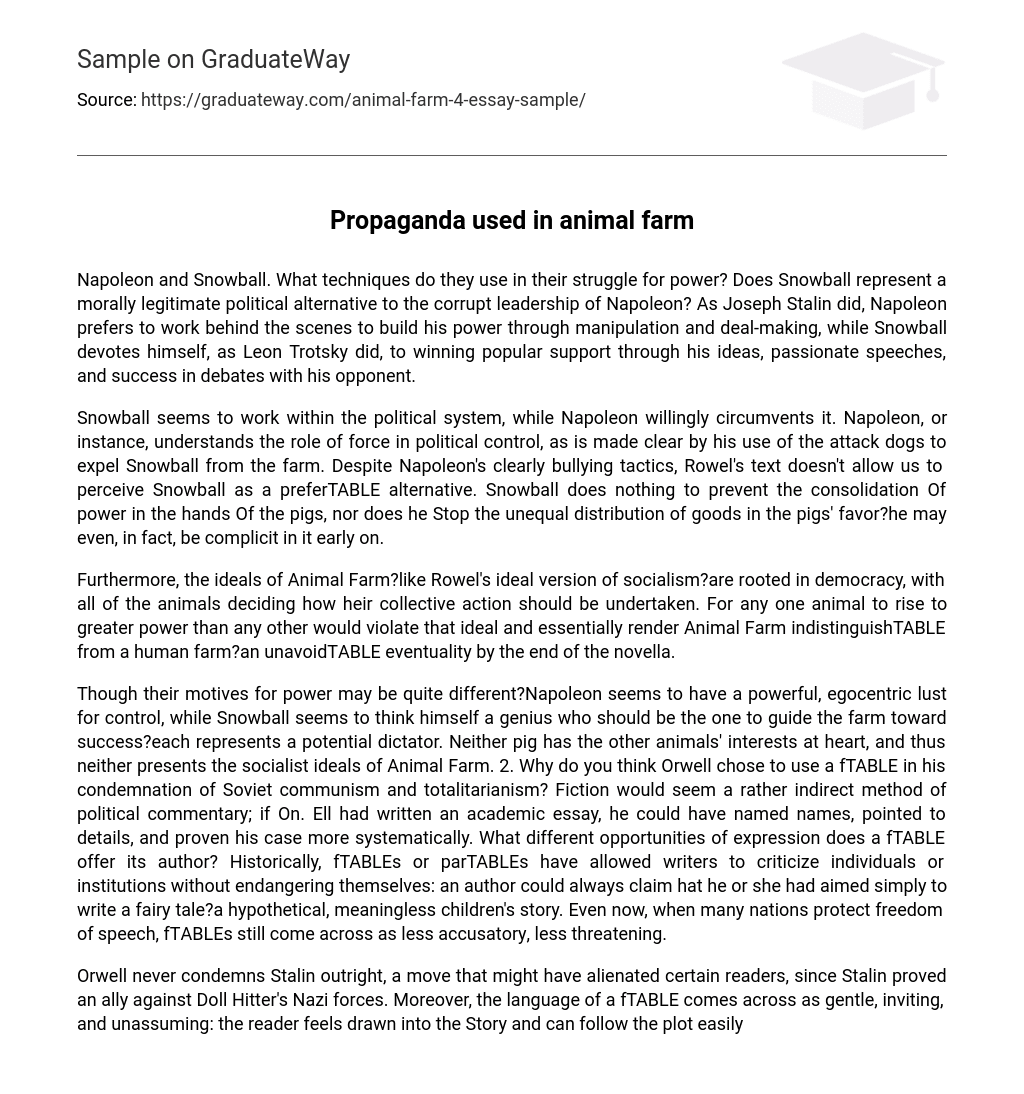Napoleon and Snowball. What techniques do they use in their struggle for power? Does Snowball represent a morally legitimate political alternative to the corrupt leadership of Napoleon? As Joseph Stalin did, Napoleon prefers to work behind the scenes to build his power through manipulation and deal-making, while Snowball devotes himself, as Leon Trotsky did, to winning popular support through his ideas, passionate speeches, and success in debates with his opponent.
Snowball seems to work within the political system, while Napoleon willingly circumvents it. Napoleon, or instance, understands the role of force in political control, as is made clear by his use of the attack dogs to expel Snowball from the farm. Despite Napoleon’s clearly bullying tactics, Rowel’s text doesn’t allow us to perceive Snowball as a preferTABLE alternative. Snowball does nothing to prevent the consolidation Of power in the hands Of the pigs, nor does he Stop the unequal distribution of goods in the pigs’ favor?he may even, in fact, be complicit in it early on.
Furthermore, the ideals of Animal Farm?like Rowel’s ideal version of socialism?are rooted in democracy, with all of the animals deciding how heir collective action should be undertaken. For any one animal to rise to greater power than any other would violate that ideal and essentially render Animal Farm indistinguishTABLE from a human farm?an unavoidTABLE eventuality by the end of the novella.
Though their motives for power may be quite different?Napoleon seems to have a powerful, egocentric lust for control, while Snowball seems to think himself a genius who should be the one to guide the farm toward success?each represents a potential dictator. Neither pig has the other animals’ interests at heart, and thus neither presents the socialist ideals of Animal Farm. 2. Why do you think Orwell chose to use a fTABLE in his condemnation of Soviet communism and totalitarianism? Fiction would seem a rather indirect method of political commentary; if On. Ell had written an academic essay, he could have named names, pointed to details, and proven his case more systematically. What different opportunities of expression does a fTABLE offer its author? Historically, fTABLEs or parTABLEs have allowed writers to criticize individuals or institutions without endangering themselves: an author could always claim hat he or she had aimed simply to write a fairy tale?a hypothetical, meaningless children’s story. Even now, when many nations protect freedom of speech, fTABLEs still come across as less accusatory, less threatening.
Orwell never condemns Stalin outright, a move that might have alienated certain readers, since Stalin proved an ally against Doll Hitter’s Nazi forces. Moreover, the language of a fTABLE comes across as gentle, inviting, and unassuming: the reader feels drawn into the Story and can follow the plot easily, rather than having to wade through a self-righteous polemic. In writing a fTABLE, O’Neill expands his potential audience and warms it to his argument before he even begins.
Because fTABLEs allow for the development of various characters, Orwell can use characterization to add an element of sympathy to his arguments. Especially by telling the stow from the point of view of the animals, Orwell draws us in and allows us to identify with the working class that he portrays. Thus, a fTABLE allows him to appeal more intensely to emotion than a political essay might enTABLE him to do. Additionally, in the case of Animal Farm, the lighthearted, pastoral, innocent atmosphere of the story stands in stark contrast to the dark, corrupt, malignant tendencies that it attempts to expose.
This contrast adds to the story force of irony: just as the idyllic setting and presentation of the story belies its wretched subject matter, so too do we see the utopian ideals of socialism give way to a totalitarian regime in which the lower classes suffer. Finally, by writing in the form Of a fTABLE, Orwell universalism his message. Although the specific animals and events that he portrays clearly evoke particular parallels in the real world, their status as symbols allows them to signify beyond specific times and places.
Orwell himself encourages this breadth of interpretation: while the character of Napoleon, for example, refers most directly to Stalin in deed and circumstance, his name evokes his resemblance to the French general-turned-autocrat Napoleon. 3. From whose perspective is Animal Farm told? Why would Orwell have chosen such a perspective? Animal Farm is not told from any particular animal’s perspective; properly speaking, it doesn’t have a protagonist. Rather, it is told from the perspective of the common animals as a group: we read, for example, that “[Oho animals were stupefied… It was some minutes before they could take it all in. This technique enTABLEs Orwell to paint a large portrait of the average people who suffer under communism. Through this choice of narrative perspective, he shows the loyalty, naiveté©, gullibility, and work ethic of the whole class of common animals. In this way, he can effectively explore the question of why large numbers of people would continue to accept and support the Russian communist government, for example, even while it kept them hungry and afraid and even after its stated goals had clearly and decisively failed. Suggested Essay Topics . How does Orwell explore the problem of rhetoric in Animal Farm?
Paying particular attention to the character Of Squealer, how is language used as an instrument of social control? How do the pigs rewrite history? 2. Discuss Boxer. What role does he play on the farm? Why does Napoleon seem to feel threatened by him? In what ways might one view the betrayal of Boxer as an alternative climax of the novel (if we consider Napoleon’s banishment of Snowball and the pigs’ initial consolidation of power as the true climax)? 3. Do you think Animal Farm’s message would come across effectively to money who knows nothing about Soviet history or the conflict between Stalin and Trotsky?





